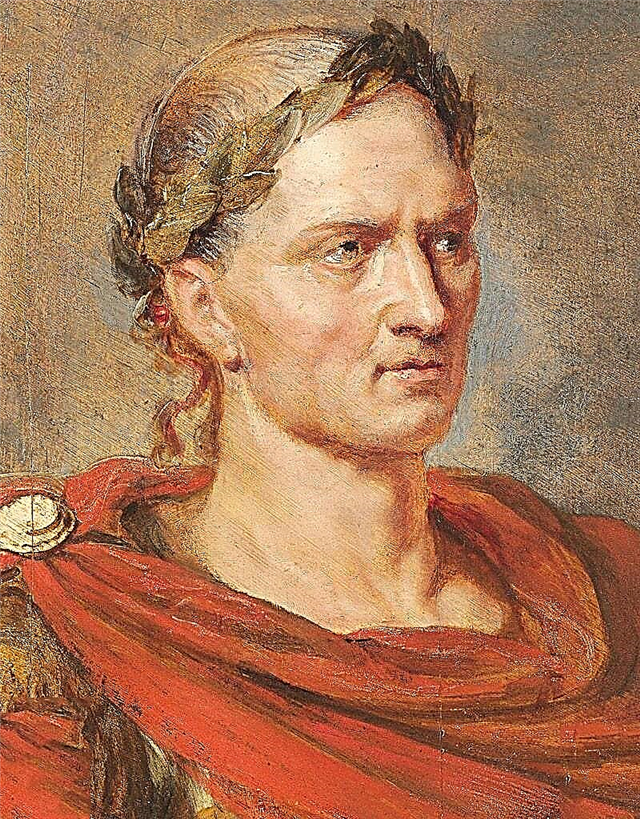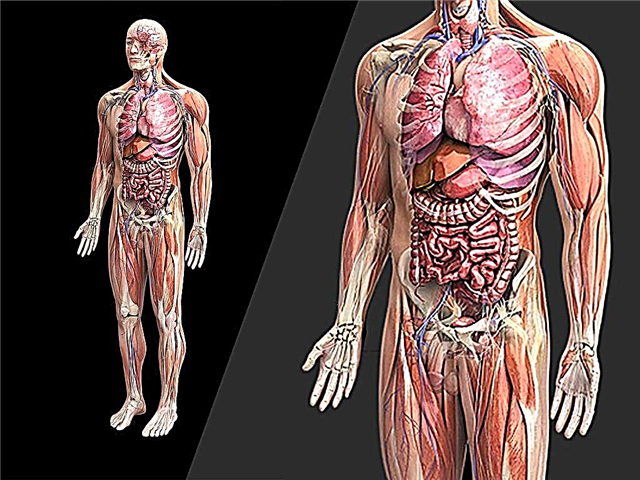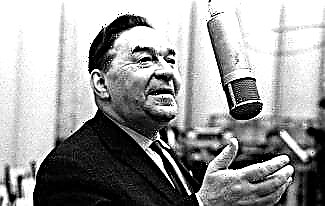Guy Julius Caesar (100-44 BC, dictator 49, 48-47 and 46-44 BC, great pontiff from 63 BC
Caesar annexed to the Roman Republic a vast territory from the Atlantic Ocean to the Rhine, gaining fame as a talented military leader.

Even during the life of Caesar, his deification began, the honorary title of the victorious commander "emperor" became part of his name. The titles of Kaiser and Tsar go back to the name of Julius Caesar, as well as the name of the seventh month of the year - July.
There are many interesting facts in the biography of Caesar, which we will talk about in this article.
So, before you is a short biography of Guy Julius Caesar.
Biography of Caesar
It is generally accepted that Gaius Julius Caesar was born on July 12, 100 BC, although there are versions that he was born in 101 or 102 BC. He grew up and was brought up in the patrician Julian family.
It is worth noting that patricians were persons who belonged to the original Roman clans, which made up the ruling class and held public lands in their hands.
Childhood and youth
All of Gaius Julius Caesar's childhood was spent in Subur - one of the districts of Rome. The father of the future commander, Gaius Julius, held a state post, and his mother came from a noble family of Kott.
Since Caesar's parents were wealthy people, they hired teachers for their son who taught him Greek, philosophy, literature, and public speaking. One of the boy's teachers was the famous rhetorician Gnifon, who once taught Cicero himself.
The Subur area, where the Yuliev family lived, was dysfunctional. There were many prostitutes and beggars in it.
The first tragedy in the biography of Guy Julius Caesar occurred at the age of 15, when his father passed away. After the death of the parent, the young man, in fact, headed the entire Yuliev family, since all close male relatives who were older than him died.
Politics
When Caesar turned 13, he was elected a priest of the god Jupiter, which at that time was considered very honorable. To do this, he had to marry the daughter of the military leader Cinna - Cornelia, since he could become a priest only by marrying a girl from the patrician family.
In 82, Caesar was forced to leave Rome, since the bloody dictator Lucius Cornelius Sulla became its head. The dictator ordered him to divorce Cornelia, but he refused to obey. Guy also aroused the wrath of Sulla due to the fact that he was a relative of his enemies - Guy Maria and Cinna.

Caesar was stripped of the Flamin title and personal property. The young man fled from Rome under the guise of a beggar tramp. Later, his friends persuaded Sulla to show mercy to Julia, as a result of which the guy was again allowed to return to his homeland.
For the Romans, Sulla's rule was unbearable. At that time, biography Gaius Julius Caesar settled in one of the provinces of Asia Minor, where he began to study the art of war. There he became an ally of Mark Minucius Therma, participating in the war against the Greek city of Methylene.
During the occupation of this city, Caesar showed himself to be a brave warrior. Moreover, he managed to save a colleague and receive the second most important award for his feat - the civil crown (oak wreath).
In 78 AD Marcus Aemilius Lepidus tried to make a coup in Rome and thereby overthrow Sulla. It is worth noting that Mark offered Caesar to become his accomplice, but he refused.
After the death of the dictator in 77, Guy wanted to bring to justice two of Sulla's associates - Gnaeus Cornelius Dolabella and Guy Anthony Gabrida. He made accusations at the trial, but none of them was ever convicted.
For this reason, Julius decided to develop his oratory skills. He went to Rhodes to take lessons from the rhetorician Apollonius Molon. On the way to Rhodes, he was attacked by Cilician pirates. When the kidnappers found out who their prisoner was, they demanded a large ransom for him.
Caesar's biographers claim that in captivity he behaved with dignity and even joked with pirates. As soon as the criminals received the ransom and freed the prisoner, Julius immediately equipped a squadron and set off in pursuit of his offenders. Having caught up with the pirates, he sentenced them to death.
In 73, Caesar became a member of the highest college of priests. Later he was elected a Roman master, after which he began to be engaged in the improvement of the city. The man repeatedly arranges lavish celebrations and gives alms to the poor. In addition, he repaired the famous Appian Way at his own expense.
After becoming a senator, Julius gained even more popularity. He participates in the "Leges frumentariae" ("Laws of Bread"), which gave the Romans the right to buy bread at reduced prices or receive it free of charge. He also developed and carried out a number of reforms in various areas.
Wars
The Gallic War is considered the most significant event in the history of Ancient Rome and the biography of Guy Julius Caesar. At that time, he was a proconsul.
Caesar went to negotiate with the head of the Celtic tribe in Geneva, since the Helvetians were forced to move to the territory of the Roman Empire due to the raids of the Germans.
Julius was able to prevent the Helvetians from entering the lands of the Roman Republic, and after they moved to the territory of the Aedui tribe allied to the Romans, Guy attacked and defeated them.

After that, Caesar defeated the Germanic Suevi, who took possession of the Gallic lands and were located along the Rhine River. In 55, he defeated the Germanic tribes, entering their territory.
Guy Julius Caesar is the first ancient Roman commander who managed to organize a successful military campaign on the territory of the Rhine: his warriors were moving along a specially erected 400-meter bridge. Nevertheless, the commander's army did not linger within Germany, deciding to go to war with Britain.
There, Caesar won many striking victories, but he soon had to retreat, since the position of his army was unstable. Moreover, at that time he was forced to return to Gaul in order to suppress the unrest. It is worth noting that the army of the Romans was inferior in number to the army of the Gauls, but thanks to the tactics and talent of Julius, she was able to defeat them.
By AD 50, Caesar had restored the territories that belonged to the Roman Republic. The commander's biographers note that he was not only an excellent tactician and strategist, but also an excellent diplomat. He managed to manipulate the Gallic leaders and sow discord between them.
Dictatorship
After Gaius Julius Caesar took power into his own hands, he became the dictator of Rome, taking full advantage of his position. He ordered to change the composition of the Senate, as well as to transform the social system of the republic.
People from the lower classes stopped striving to get to Rome, as Caesar canceled the payment of subsidies and reduced the distribution of bread.
At the same time, the dictator was actively engaged in the improvement of the empire. In Rome, the Temple of the Divine Julius was built, where the Senate meeting was held. In addition, a statue of the goddess Venus was erected in the center of the city, since Caesar has repeatedly stated that representatives of the Julian Caesar family are related to her.

Caesar was named emperor, his images and sculptures adorned temples and city streets. Any of his phrases was regarded as a law that could not be violated.
The commander sought to achieve the sacralization of his personality, focusing on Alexander the Great, who took over the traditions of government from the conquered Persians.
A couple of years before his death, Caesar announced a reform of the Roman calendar. Instead of the lunar, a solar calendar was introduced, consisting of 365 days with one additional day every 4 years.
Starting in 45, a new calendar, known today as the Julian calendar, began to operate. It was used in Europe for about 16 centuries, until the development, by order of Pope Gregory 13, a slightly revised version of the calendar, called the Gregorian.
Personal life
Over the years of his biography, Caesar was married at least 3 times. The status of his relationship with Cossutia, a girl from a wealthy family, is not entirely clear due to the poor preservation of documents about the commander's youth.
It is generally accepted that Julius and Cossutia were engaged, although Plutarch called the girl his wife. Parting with Cossutia apparently happened in 84 g. Soon the man married Cornelia, who gave birth to his daughter Julia. In 69, Cornelia died during the birth of her second child, who also did not survive.
The second wife of Gaius Julius Caesar was Pompeia, the granddaughter of the dictator Lucius Sulla. This marriage lasted 5 years. For the third time, the emperor married Calpurnia, who came from a noble plebeian dynasty. In the second and third marriages, he had no children.

Throughout his life, Caesar had many mistresses, including Servilia. He condescended to Servilia, trying to fulfill the wishes of her son Brutus and making him one of the first persons in Rome. There is also information that Guy allegedly had sexual relations with men.
The most famous woman of Caesar is the Egyptian queen Cleopatra. Their love idyll lasted about 2.5 years, until the assassination of the emperor. From Cleopatra he had a son, Ptolemy Caesarion.
Death
Gaius Julius Caesar died on March 15, 44 BC at the age of 55. He died as a result of a conspiracy of senators who were unhappy with his rule. The conspiracy involved 14 people, the main of whom was Mark Junius Brutus, the son of the dictator's mistress.
Caesar was very fond of Brutus and took great care of him. However, the ungrateful young man betrayed his patron for the sake of political interests.
The conspirators agreed that each of them should strike at Julius one stroke with a dagger. According to the historian Suetonius, when Caesar saw Brutus, he asked him the question: "And you, my child?"
The death of the great commander hastened the fall of the Roman Empire. When the Romans, who loved their emperor, learned about what had happened, they were furious. However, it was already impossible to change anything. It is worth noting that the only heir was named Caesar - Guy Octavian.
Photo of Caesar


















